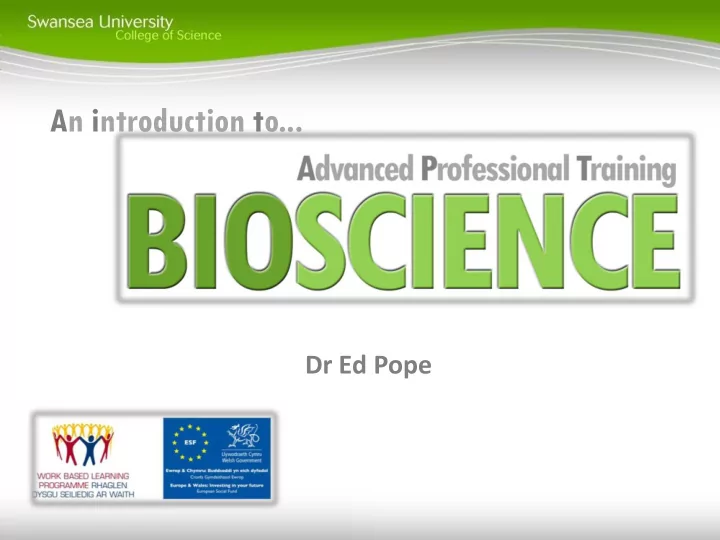

An introduction to... Dr Ed Pope
Where has the APT project come from? “Wales must move towards a more R&D intensive & knowledge - based economy” “Economic Renewal: A new direction” Welsh Assembly Government July 2010 APT aims to address the specific needs of Welsh industry by: • Increasing practical skills in the Welsh Bioscience labour market • Improving the attractiveness of Wales to business
Free training to Welsh companies Work-Based learning (~ £3 million) funded by the European Social Fund until the end of 2013 Swansea University-accredited courses designed to meet the needs of individuals and businesses in the Welsh Bioscience sector Fully subsidised for eligible companies & individuals within the Convergence Region of Wales
Yes, it’s free The company’s contribution is the employee time to attend the course(s) There is a substantial online portion to the courses to minimise staff time spent away from place of work The participant must live or work within the Convergence Region of Wales The practical element of the courses is central All courses are accredited by Swansea University
Two main strands 1. Laboratory-based courses
2. Ecology-based courses
Work-based learning with APT Bioscience Dr Dan Eastwood Lead Tutor
Flexible, work-based learning 3 ways to learn: 1. Select a stand-alone module 2. Choose a suite of complementary modules 3. Pick a specialist package of modules HEFCW level 4 (entry) and 7 (postgraduate) modules • Most courses are 10 credits (some supplementary modules are 5 credits) • Individuals to gain up to 60 credits through work-based learning Laboratory Ecology
Practical, Theoretical & Blended Learning
Level 4 (Entry) Laboratory skills – will run again soon! Also: Experimental design, Dealing with data, Scientific report writing Essential light microscopy – 31 st Jan & 1 st Feb Biochemical separation techniques – 3 rd , 9 th & 10 th Feb Practical microbiology – 22 nd & 29 th Feb, 7 th March Experimental biochemistry – 2 nd , 8 th & 9 th March
Level 7 (Postgraduate) Techniques in Molecular Biology Bioinformatics modules: - Introduction to computational biology - Statistical methods for bioinformatics & computational biology - Algorithms for bioinformatics and computational biology Biochemical structural characterisation & elucidation Drug / device development
Very well run by some great Feedback professionals. Very informative with great fieldwork, call them as soon as possible.... Really thorough training and such V. Yadh, Affordable Science friendly, knowledgeable tutors A. Rees, Gwent Wildlife Trust The course content was informative and very educational. I will have no problem in promoting • 100% recommendation this course to other interested professionals. Thanks everyone. • Returning participants C. Holmes, National Botanic Gardens of Wales
The APT Team here today Dan Eastwood Kate Parkinson Liz Bond Ed Pope Gabriela Juma Neil Price http://APTbioscience.swansea.ac.uk Room 127 Wallace Building. Tel: (01792) 295379
Recommend
More recommend